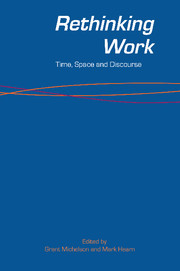PART II - SPACE
Published online by Cambridge University Press: 05 June 2012
Summary
Foucault observed that ‘time probably only appears as one of the possible games of distribution between the elements that are spread out in space’. Just as we are governed by our subjective constructions of time, we do not live or work in ‘homogeneous and empty space’, but in space ‘laden with qualities’ (Foucault 1998: 177). We inhabit social and private space invested with our values and relations of power – space reflecting, as Geertz (1973: 5) realised, the webs of cultural significance that we have spun for ourselves. Work is one of the most contested domains of our social space. As our contributors argue, the nature of union power, the movement of migrant labour, the international organisation of work and the operation of markets all reflect space as a distribution of labour market function and power, and the right of workers, unions and managers to contest these allocations. Just as the distribution of time is not only an operation of power directed down upon subjects, the distribution of space is an exchange between individuals and institutions. Space, Foucault suggested, perhaps best understood as ‘relations of emplacement’, reflects the negotiation of our place in the realm of work.
Prominent labour geographer Andrew Herod defines workers and capitalists as spatially embedded in their ‘material geographies’. Constrained by their embeddedness, workers are nonetheless ‘active social and spatial actors’, engaged in ‘intense political struggles to structure the geography of capitalism’ in service to their rights and needs (Herod 2002).
Information
- Type
- Chapter
- Information
- Rethinking WorkTime, Space and Discourse, pp. 119 - 122Publisher: Cambridge University PressPrint publication year: 2006
Accessibility standard: Unknown
Why this information is here
This section outlines the accessibility features of this content - including support for screen readers, full keyboard navigation and high-contrast display options. This may not be relevant for you.Accessibility Information
- 1
- Cited by
